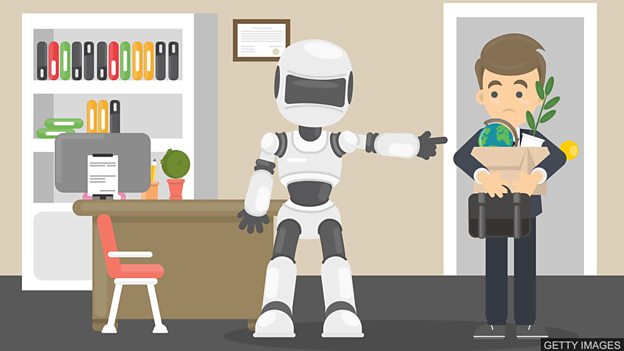人工智能和机器人科技在飞速发展,很多人都担心这类技术对工作场所带来的影响。人工智能技术能以更低的成本和更高的效率工作,这是否意味着机器人将变成各类职业的主力军?如果真的会这样,那么人类的工作是否会岌岌可危?跟《随身英语》一同畅想未来工作。
课文内容
Vocabulary: Jobs 词汇:工作
As new technology is introduced, there are many who worry about its impact on our current and future lifestyles – particularly when it comes to jobs. It is a current belief that with the rise of robotics and artificial intelligence, many people’s jobs, and therefore their livelihoods, are likely to be lost to automation.
This type of fear isn’t new. In the 19th century, the automated weaving machine was revolutionising the English textiles industry and would contribute to the Industrial Revolution. When manual workers became redundant, it sparked protests at the loss of their vocation.
Automation in the work place is nothing new. Machines have been performing menial tasks on our behalf for years, allowing us to escape the drudgery that accompanies many repetitive jobs. In fact, the International Federation of Robotics states that in manufacturing on average there are now 74 robots per 10,000 employees. That has risen from 66 in 2015.
General Manager of Digital Customer Engagement Solutions at tech firm Nuance, Bernard Louvat, believes that ‘AI is a big threat to low-skilled jobs, no question.’ He also thinks that AI chatbots will oust most call centre staff within a decade. When you consider that a large telecoms company like AT&T employs around 100,000 call centre staff, that’s a lot of people on the dole.
And that’s just one industry. A recent report from the McKinsey Global Institute, a private sector think tank, states that nearly two thirds of all jobs could have at least 30% of their activities automated by 2030.
However, McKinsey also believes that this new technology will also ‘create new occupations that do not exist today, much as technologies in the past have done.’ As the horse gave way to the car, hostlers became mechanics and mechanised manufacturing drove up wages and created more long-term roles than it destroyed. In fact, figures from the World Bank have shown that despite a 2.2 billion rise in population between 1991 and 2017, global unemployment has fallen by 0.3%.
‘It’s an evolution of work’ says Ian Barkin, co-founder of Symphony Ventures, a robotic process automation specialist. As low-skilled jobs are taken on by AI, people will need to learn new skills. ‘This calls on us to focus on up-skilling, Technology can lead to job reductions but it doesn’t have to,’ says Barkin.
Whether or not robotics and AI will leave us all jobless remains to be seen. Current views on the subject are mixed. Increased automation could indeed lead to a loss of some jobs, but at the same time is likely to create many more as new skills are required. Will they balance out? I’ll get my AI assistant to get back to you on that one.
词汇表
livelihood 生计
redundant 失业的,被裁员的
vocation 工作
menial(工作)枯燥的、不体面的,带贬义
drudgery 苦工,辛苦乏味的工作
repetitive 单调重复的
employee 公司员工,雇员
low-skilled job 低技能工作
oust 赶走、夺取
staff 全体工作人员
on the dole (英式表达)靠领取救济金生活
industry 行业、产业
occupation 职业
wage(尤指给体力劳动者支付的)工钱、报酬
role 工作
take on 承担(一份工作)
up-skill (通过培训)提升技能
jobless 失业的
测验与练习
1. 阅读课文并回答问题。
1. What historical example of technology causing a loss of jobs does the article give?
2. True or False: Automation in the work place is a very new concept.
3. Approximately how much automation across all jobs is estimated by 2030?
4. In McKinsey’s opinion, what will happen as jobs are lost to automation?
5. According to Ian Barkin, what do these changes call us to focus on?
2. 请在不参考课文的情况下完成下列练习。选择一个意思合适的单词填入句子的空格处。
1. I hate being a builder. It’s the ______ of it. All the tasks are boring or physically hard!
redundant drudgery low-skilled job wages
2. By a vote of no confidence, Phillip is ______ from his position as CEO by Tom.
redundant repetitive ousted jobless
3. After I lost my job at the factory, I was ______ for 5 years. I lived on benefits.
menial ousted on the dole occupation
4. I’m really sorry. I’m so busy with tasks, I don’t think I can ______ any more.
oust take on up-skill jobless
5. The loss of business means that we’ll have to cut ______. The staff won’t be happy.
vocation employees wages drudgery
答案
1. 阅读课文并回答问题。
1. What historical example of technology causing a loss of jobs does the article give?
In the 19th century, the automated weaving machine caused manual workers to become redundant, sparking protests at the loss of their vocation.
2. True or False: Automation in the work place is a very new concept.
False. Automation in the work place is nothing new. Machines have been performing menial tasks on our behalf for years.
3. Approximately how much automation across all jobs is estimated by 2030?
A recent report from the McKinsey Global Institute states that nearly two thirds of all jobs could have at least 30% of their activities automated by 2030.
4. In the McKinsey Global Institute’s opinion, what will happen as jobs are lost to automation?
McKinsey also believes that this new technology will also ‘create new occupations that do not exist today, much as technologies in the past have done.
5. According to Ian Barkin, what do these changes call us to focus on?
They call on us to focus on up-skilling.
2. 请在不参考课文的情况下完成下列练习。选择一个意思合适的单词填入句子的空格处。
1. I hate being a builder. It’s the drudgery of it. All the tasks are boring or physically hard!
2. By a vote of no confidence, Phillip is ousted from his position as CEO by Tom.
3. After I lost my job at the factory, I was on the dole for 5 years. I lived on benefits.
4. I’m really sorry. I’m so busy with tasks, I don’t think I can take on any more.
5. The loss of business means that we’ll have to cut wages. The staff won’t be happy.



